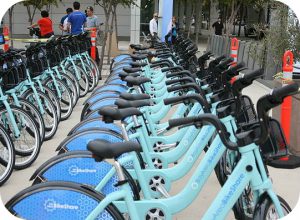 Over the last few years, bike-sharing programs have become commonplace in most of the world’s major cities. In New York, for instance, more than 10,000 Citibikes are available for visitors to ride at any time of day. All they need to do is find a docking station, pay a small fee to unlock a bike, and then return it to another kiosk whenever they’re finished. But some other cities aren’t nearly as orderly with their bike-sharing programs. In Wuhan, a Chinese city with about the same population as New York, residents can choose from more than 700,000 undocked bicycles scattered all across town.
Over the last few years, bike-sharing programs have become commonplace in most of the world’s major cities. In New York, for instance, more than 10,000 Citibikes are available for visitors to ride at any time of day. All they need to do is find a docking station, pay a small fee to unlock a bike, and then return it to another kiosk whenever they’re finished. But some other cities aren’t nearly as orderly with their bike-sharing programs. In Wuhan, a Chinese city with about the same population as New York, residents can choose from more than 700,000 undocked bicycles scattered all across town.
The situation is the same in dozens of other Chinese cities as well-funded companies like Ofo and Mobike fight for dominance in this burgeoning industry. In order to rent one of these two-wheelers, customers must first locate a bike using an app. They then scan a code to unlock the vehicle and start their ride. Once they’re finished, they can lock the bike up again wherever they please. Not only is this system more efficient than programs like Citibike, but it’s also much cheaper. For example, a Mobike ride in Washington, D.C., costs just $1 per half hour, less than half the amount charged by the city’s government-sanctioned bikeshare system.
Still, not every city wants to be suddenly flooded with bicycles. In fact, the German city of Munich recently booted out a company called Obike after they dumped 7,000 two-wheelers on the streets in September. Residents complained that piles of bicycles had begun to accumulate on sidewalks and in parking lots. “Things began spiraling out of control,” said the supervisor of Munich’s cycling programs. “It just overwhelmed people.” Matters are even worse in Chinese cities like Wuhan where stacks of tangled bikes are becoming common sights. Beijing, Shanghai, and at least five other cities have banned bike-share companies from adding to their fleets. Of course, this has only encouraged these firms to look beyond China to expand their operations. Time will ultimately tell whether cities will accept dockless bike-share programs or reject them like Munich did.
Questions:
- What are the advantages of a using a dockless bike-share system? What are the disadvantages?
- Will dockless bike-share companies like Mobike eventually overtake established operations like Citibike? Why or why not?
Source: Carol Matlack, Stefan Nicola, and Ania Nussbaum, “Bike-Sharing Upstarts Are Flooding Europe With Cheap Cycles,” Bloomberg BusinessWeek, November 9, 2017. Photo by Richard Masoner.
